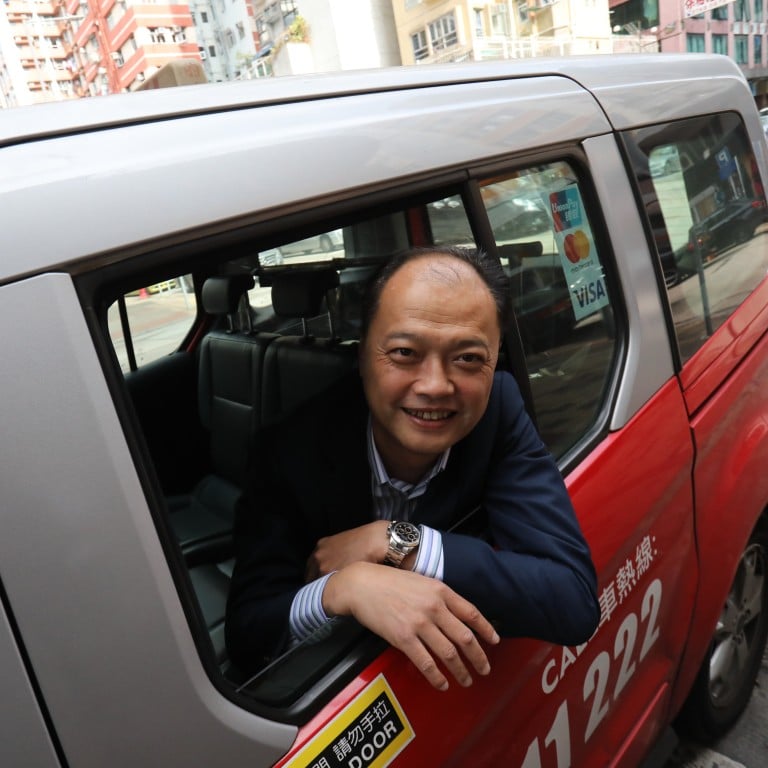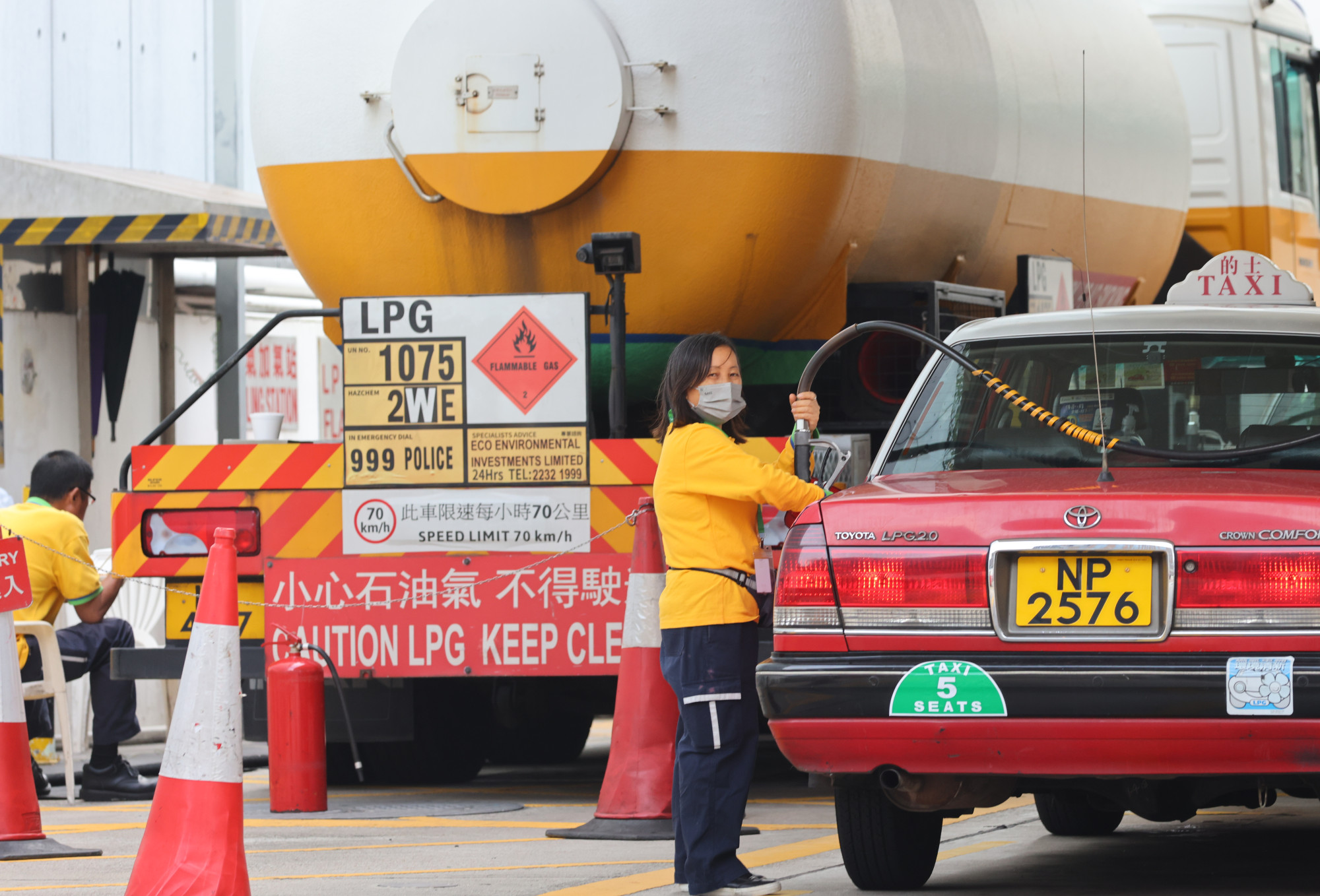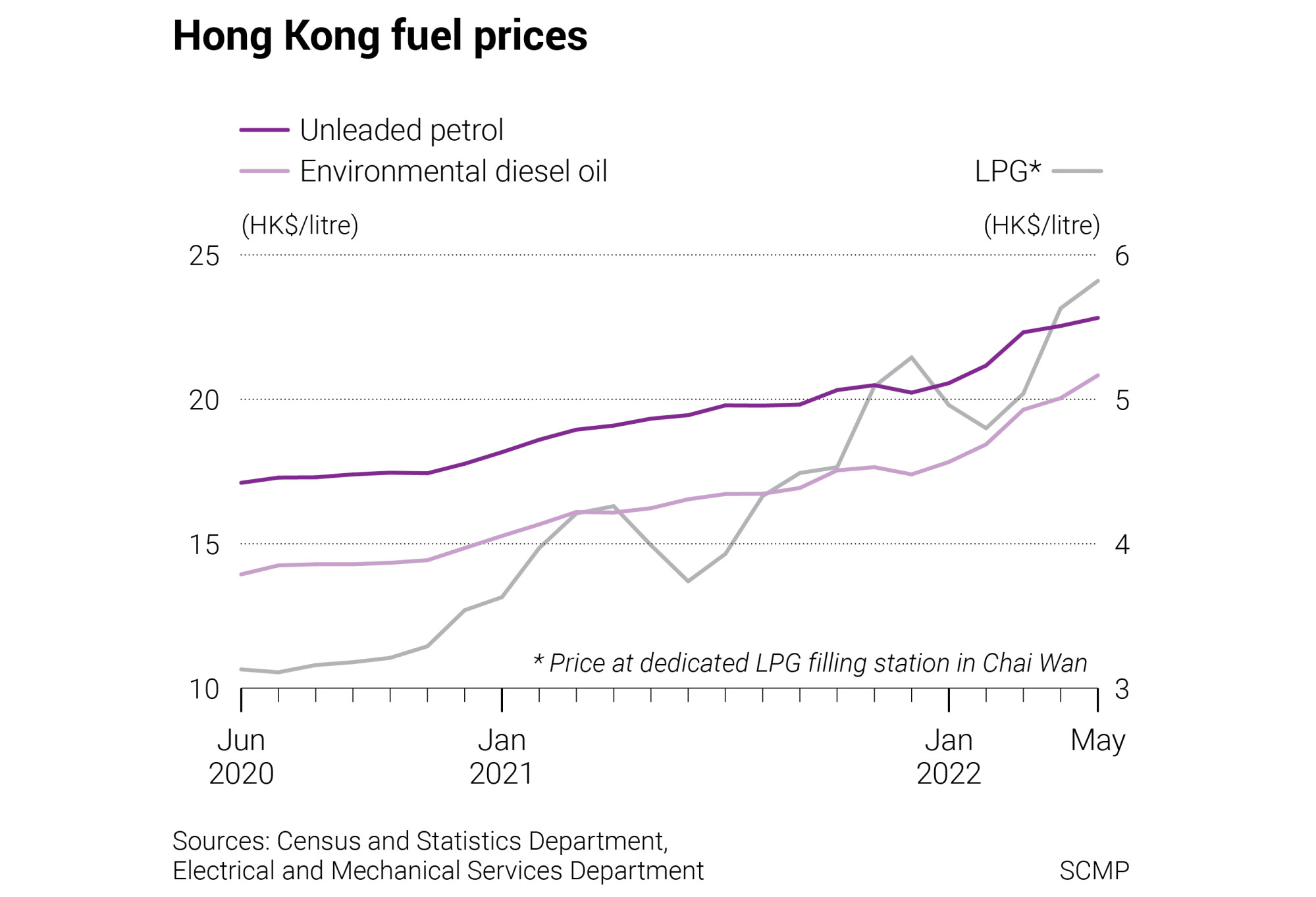
As fuel prices shoot up, Hong Kong taxi drivers work smarter, other motorists choose to leave the car at home
- As fuel costs eat into their earnings, some cabbies forgo days off, while others rely mainly on calls
- To keep fuel bill down, family man who bought a car two years ago is now mainly a Sunday driver
The 40 per cent jump in the price of liquefied petroleum gas (LPG) left him spending HK$3,000 more to fill up his tank.
Divorced with two sons aged 11 and 12, Wong, 46, said earning less affected the way they spent time together, and he also cut some of their private tutorial classes.
“When the boys came home to me on weekends, we used to go out and have fun at amusement parks, buying toys and games, or having great meals. It was very easy to spend more than HK$1,000 with them in just one day. Now we stay home a lot during weekends,” he said.

Wong is among Hong Kong motorists hit by rising fuel costs in the wake of the Ukraine-Russia war. The city was already notorious for having the costliest petrol and diesel in about 150 jurisdictions, according to globalpetrolprices.com.
The average retail price of unleaded petrol rose 33.4 per cent, from HK$17.11 per litre in June 2020 to HK$22.32 in May this year, official data showed.
The overall price of LPG jumped 55.6 per cent in the 12 months to May. At a dedicated station in Wan Chai, for example, it soared 35.6 per cent from HK$3.99 per litre in June last year to HK$5.41 in May.

A government subsidy of HK$2 per litre of LPG for public light buses and taxis, part of the Covid-19 pandemic relief measures, will end in December.
Edmond Chau Kwok-keung, chairman of the Hong Kong Taxi and Public Light Bus Association, which has more than 10,000 members, said drivers working an average 12-hour shift used 35 to 40 litres of LPG per day.
Since the price hit HK$5 per litre last November, they have been paying HK$100 more each day for fuel.
Apart from meal time, we spend two to three hours a day queuing up for fuel
Chau said the only way for cabbies to earn more was for them to get more rides from street hails and phone orders.
Cabby Wong said that would not work because of the long queues at dedicated filling stations which charged a little less.
“We work eight to nine hours in a 12-hour shift. Apart from meal time, we spend two to three hours a day queuing up for fuel,” he said.
New Territories green cab driver Leung Siu-ming, 38, said he had given up his weekly day off to spend more time on the road.
“My income has shrunk because of the fuel cost, but it’s easy for me – just work more,” said the unmarried cabby.
To save on food expenses, he has been eating mostly discounted takeaway meals offered by restaurants.
“They are god-sent and way cheaper than dining in,” he said. “Sometimes I just go to my parents’ home to eat.”
Get ready to pay HK$3 more per taxi ride in Hong Kong this summer
Martin Chu, 56, a 17-year veteran in the industry, said he had managed to maintain his income by relying almost entirely on phone orders.
“Instead of cruising aimlessly and looking for passengers, I only take phone orders. I can estimate how much I would earn for a ride and decide whether to take it,” he said.
Jason*, 38, quit his job three years ago to stay home and care for his daughter. With his wife working full-time as a store manager for a cosmetics brand, he became a part-time Uber driver to supplement the family income.
Although ride-hailing is illegal in Hong Kong, the service is popular and Uber has about 14,000 drivers.
Jason said costly petrol combined with the Covid-19 pandemic shaved 40 per cent off his average monthly income of HK$12,000. Driving mostly from 7pm to 1am, five days a week, he saw his earnings shrink especially in March and April this year.
“I couldn’t even make HK$8,000 a month,” he said.
He sold his car last month and took a part-time job stocking shelves in a convenience store.
“Here, I am guaranteed HK$60 per hour for a six-hour shift, five days a week. I feel more free now,” he said. “I don’t have to pay for fuel, car park rent, vehicle insurance and other fees.”
Hong Kong residents to pay more for gas from August after tariff hike
Some private car owners feeling the fuel price squeeze have changed their driving behaviour.
Customer service manager Fox Chan, 40, bought a car two years ago to keep his receptionist wife and young daughter safe on outings during the pandemic.
When his fuel bill shot up by 40 per cent and hit HK$1,400 a month earlier this year, he decided to drive only when necessary.
“Now, I drive mainly to pick up my daughter after school or leave her with carers like my mother-in-law,” he said. “I’ve also stopped driving to work.”
However, he is not ready to give up the car. “I still enjoy being a Sunday driver taking my wife and girl out for family adventures,” he said.
Simon Lee Siu-po, an honorary fellow of the Asia-Pacific Institute of Business at Chinese University, said the skyrocketing fuel price was a problem for the government and urged a review of the tax for unleaded petrol and reforms to the tender system for petrol companies.
“Retail petrol prices in Hong Kong include a tax of HK$6.06 per litre for unleaded petrol, land costs and government rent, and have already reached HK$10 per litre,” he said. “Taking into account operating costs and profit margins, there is no wiggle room left for oil companies.”
*Name changed at interviewee’s request.

